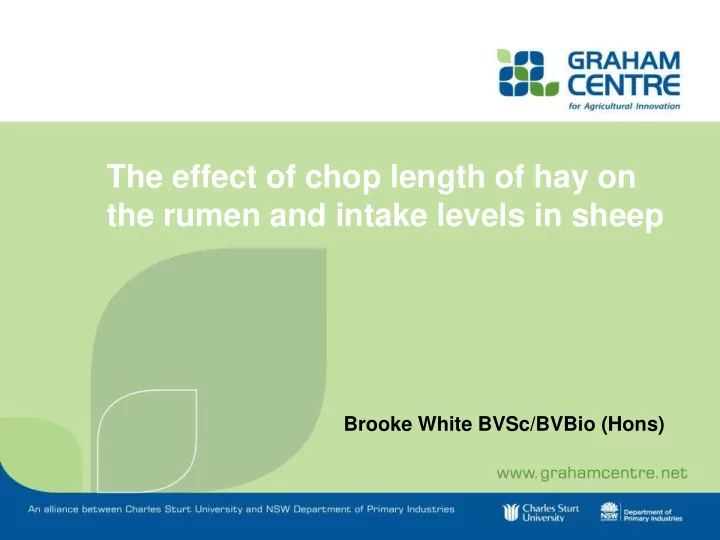

The effect of chop length of hay on the rumen and intake levels in sheep Brooke White BVSc/BVBio (Hons)
Acidosis • Acidosis: rumen pH falls below 5.0 and lactate producing bacteria predominate. • Sub-acute rumen acidosis (SARA): rumen pH falls to between ~6.0 and 5.0 and there is an increase of volatile fatty acids in the rumen
Volatile Fatty Acids • Microbes in the rumen ferment carbohydrates into volatile fatty acids which are absorbed through the rumen wall into the blood stream. • Volatile fatty acids are the main energy source for ruminants. They are used primarily by the microorganisms for reproduction and growth, with the excess production being used by the ruminant itself. • The three main volatile fatty acids produced in ruminants are acetic acid , butyric acid and propionoic acid
How do they counteract the acid production? They CHEW!
What Do We Already Know? • Dairy industry – well established guidelines • Sheep industry – no published studies regarding chaff
The Trial • 24 wethers
• Three treatment groups – long, medium and short. • .
Samples • Rumen fluid pH and VFA concentrations measured for three days. • Intake of chaff and grain measured for ten days.
What did we find? • No difference in pH • Some significant differences in VFA concentrations. • Significant differences in intake at 3 hours and 24 hours after feeding.
Rumen pH 7.60 7.40 7.20 7.00 6.80 Rumen pH 6.60 Long Med 6.40 Short 6.20 6.00 5.80 5.60 Pre feeding Post feeding chaff only Post feeding grain day Post feeding grain day Post feeding grain day 1 2 3 Time
Total VFAs 90 80 70 60 Concentration mmol/L 50 Long 40 Medium Short 30 20 10 0 Pre feeding Chaff Grain day 1 Grain day 2 Grain day 3 Sample Time
3 Hour Chaff Intakes 0.35 0.3 0.25 0.2 Chaff eaten (kg) Long 0.15 Medium Short 0.1 0.05 0 Grain day 1 Grain day 2 Grain day 3 -0.05 Sample Time
Daily Chaff Intakes 1.2 1 0.8 Intake (kg) 0.6 Long Medium Short 0.4 0.2 0 1 2 3 4 5 6 7 8 9 10 Experimental Day
So What Does This Mean? Short Eat it Good pH Good VFA levels Medium × Eat it × Lowest pH OK VFA levels Long Eat it Good pH Good VFA levels
So What Do We Feed? • Short chaff initially: intake levels • Long chaff after grain adaptation: buffering effects and long term rumen stability.
Acknowledgments: Supervisors: Dr Michael Friend & Dr Edward Clayton NSW Department of Primary Industries Charles Sturt University Animal and Veterinary Science Students
Recommend
More recommend